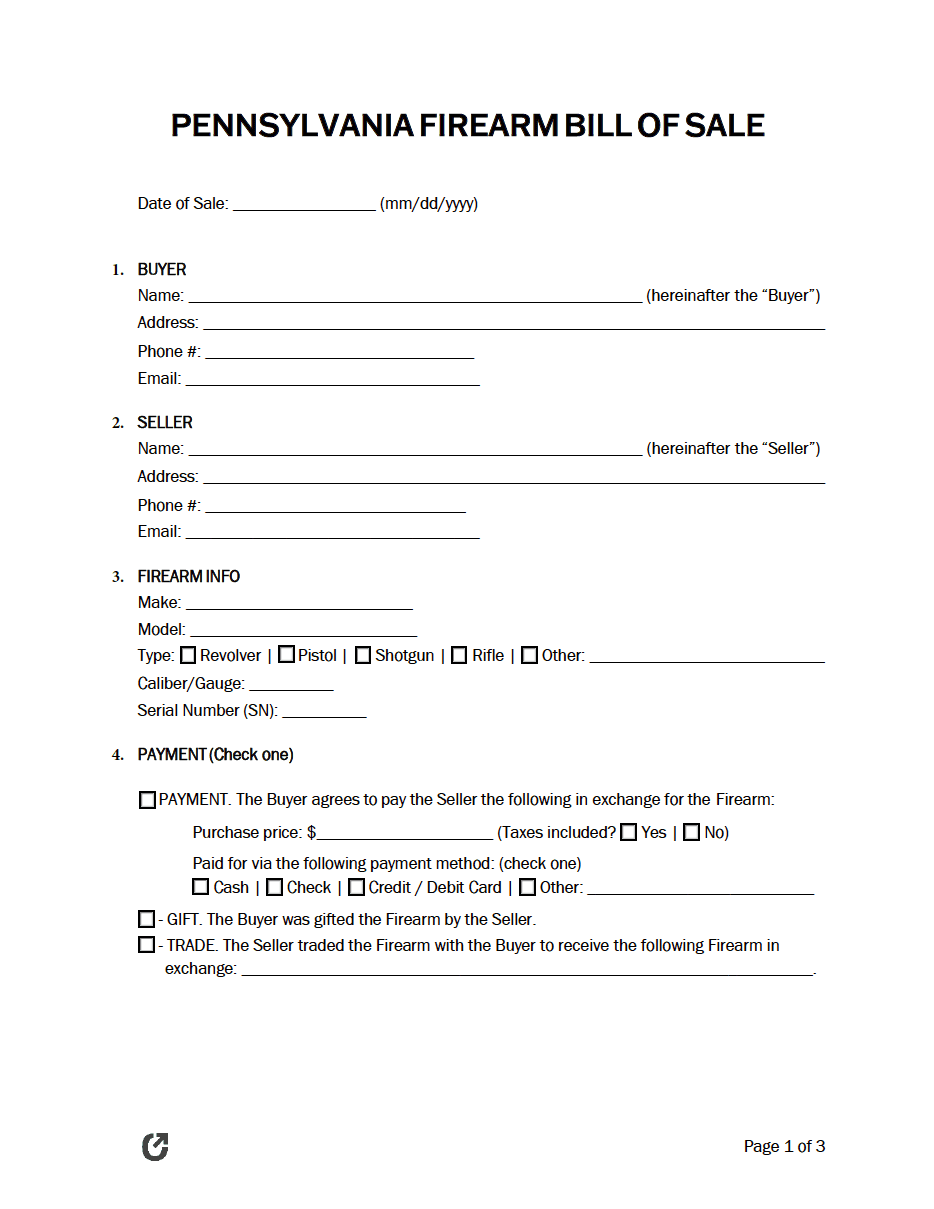Pennsylvania Firearm Bill of Sale Form
A Pennsylvania firearm bill of sale form functions as a legal document that records the details of the transfer or sale of a firearm within the state. It generally includes critical information, such as the buyer’s and seller’s names and addresses, the transaction date, and specific details of the transferred firearm (e.g., the make, model, and serial number). The form aims to establish a clear reassignment of ownership, thus helping prevent potential legal complications from firearm transactions. Individuals involved must accurately provide the required details to complete the document, sign as requested, and retain copies for their records. Taking these actions helps to safeguard both parties’ interests and comply with state regulations.
What is a Pennsylvania Gun Bill of Sale?
A Pennsylvania gun bill of sale protects both parties during a firearm transaction. Before transferring, the seller must verify the buyer’s eligibility to own a weapon. This process includes checking if the buyer has completed a background check and met other local requirements. The form also provides a clear sale record, which can prove ownership if necessary. Completing the form with full transparency and adherence to legal guidelines can help foster responsible gun ownership and use in the state.
How to Apply for a License to Carry (LTC)
Pennsylvania residents do not need a permit to buy a firearm. However, they must apply for a LTC to have their gun on their person in authorized public places. This process requires the applicant to meet the minimum age requirement of twenty-one (21) years. The applicant must also verify their residency and consent to a background check.
Step 1 – Qualifiers
Individuals must be twenty-one (21) years old to qualify for a Pennsylvania LTC. They must also possess a clean criminal record, free from convictions for offenses like aggravated assault, stalking, or convictions for controlled substances.
Further, they should not be subject to active protection from abuse orders or have mental illness. Notably, applicants must have residency in Pennsylvania and provide it using their state identification. Failing to meet the criteria can cause disqualification.
The final decision rests with the county sheriff or chief of police in the applicant’s jurisdiction. Attendants evaluate the application following Pennsylvania’s legal guidelines to determine eligibility for the concealed carry permit. Applicants should thoroughly acquaint themselves with the specific state requirements before sending the paperwork to ensure a successful process.
Step 2 – Firearms Training (Optional)
Unlike many other states, Pennsylvania does not require residents to obtain a firearms training certification. However, many individuals take the class to expand their knowledge of safe and responsible gun ownership.
The training encompasses educational modules on the safe handling, storage, and usage of firearms, alongside detailed instructions on the legal aspects surrounding gun ownership in the state. To get certified, individuals should seek a reputable institution or trainer authorized to provide such education. Moreover, students attend a class or series of courses, followed by a written and practical examination to gauge their understanding and competence.
Step 3 – Submit the Application
Completing a LTC application in Pennsylvania requires applicants to meet the eligibility criteria. They must be twenty-one (21) years old without firearm-carrying restrictions.
LTC applications differ by county in the state. Each sheriff’s office has a unique form that they provide. Therefore, residents must visit their county’s website or office to acquire the document. Individuals who live in Philadelphia must give the application to the chief of police.
Regardless of the county, the form requires detailed personal information. The candidate must disclose any prior criminal convictions or mental health issues. In addition, they must provide their photo identification (i.e., a license or state identification card), which serves as proof of residency. Applicants must also pay a non-refundable fee by check or money order.
Step 4 – Processing
The authorizing office conducts a background check after the applicant submits the paperwork and payment. This process takes approximately forty-five (45) to complete. Once approved, the resident receives their license by mail. The individual can dispute the decision if denied, as noted in the letter.
Concealed carry licenses last for five (5) years in Pennsylvania. When carrying their firearm, they must have the LTC on their persons or in their vehicle. Otherwise, law enforcement can cite or arrest them as they see fit. Residents should stay current on state laws to ensure they remain law-abiding.
Step 5 – Renewal
LTC renewal in Pennsylvania is a straightforward process essential to maintain the legality of carrying a concealed firearm. Individuals should initiate the renewal process around sixty (60) days before the current license’s expiration to avoid any lapse in coverage.
Applicants must complete a renewal application, which they can obtain from their local county sheriff’s office (or, in Philadelphia, the Gun Permits Unit). Each office has specific rules for residents to follow; however, the form generally requires basic personal information and details about the current license. After filling out the renewal form, individuals should visit their local issuing authority to apply in person, carrying their current LTC and valid photo identification.
A non-refundable processing fee, payable via check or money order, is also applicable. Upon submission, the office conducts a background check as a part of the assessment. If approved, a new license, valid for another five (5) years, is issued to the applicant. Individuals are encouraged to be aware of any changes to the process or requirements by regularly checking the official state or county websites.
